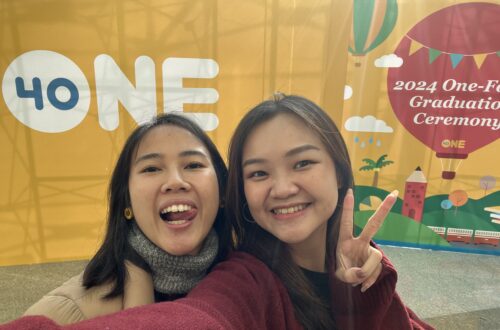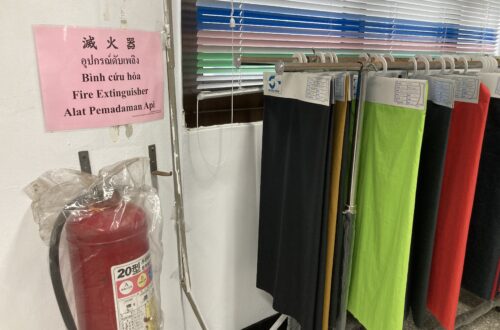Yesterday, on October 6, 2024, I spent the day immersed in One-Forty’s vibrant course environment. I started with the Indonesian financial management class in the morning, participated in a One-Forty donor event for ASML—a Dutch semiconductor company—at a separate venue, and wrapped up the day with the Chinese listening and speaking class with the Indonesian students in the afternoon. In this post, I’ll dive into my experiences and insights from the morning’s financial management session, where I observed the students’ diverse backgrounds, entrepreneurial aspirations, and the unique teaching approaches that made this class so impactful.
Background: One-Forty’s Course Day for Migrant Workers
At One-Forty, Sunday has become a day of learning and empowerment for Indonesian and Filipino migrant workers living in Taiwan. The organization, known for its commitment to supporting migrant communities, hosts a full day of classes, tailored to the needs and aspirations of these workers who gather from across Taiwan. In the morning, Filipino and Indonesian students join Mandarin and computer classes, as well as specialised courses like financial management and self-development. Later in the afternoon, Indonesian students attend reading and writing sessions in Chinese, alongside listening and speaking classes.
The setting for these classes is Like Co-Living Space, conveniently located near Taipei Main Station, a popular gathering point for migrant workers on their one day off each month. This particular Sunday was the penultimate course day for One-Forty this year, marking an important step toward the students’ upcoming graduation in December. Teachers, teaching assistants, and volunteers arrived early for a briefing, dressed in One-Forty’s distinctive black T-shirts, ready to guide and support the participants through a packed day of learning.
Structure and Focus of the Financial Management Class
Time: 9:30-11:30 am
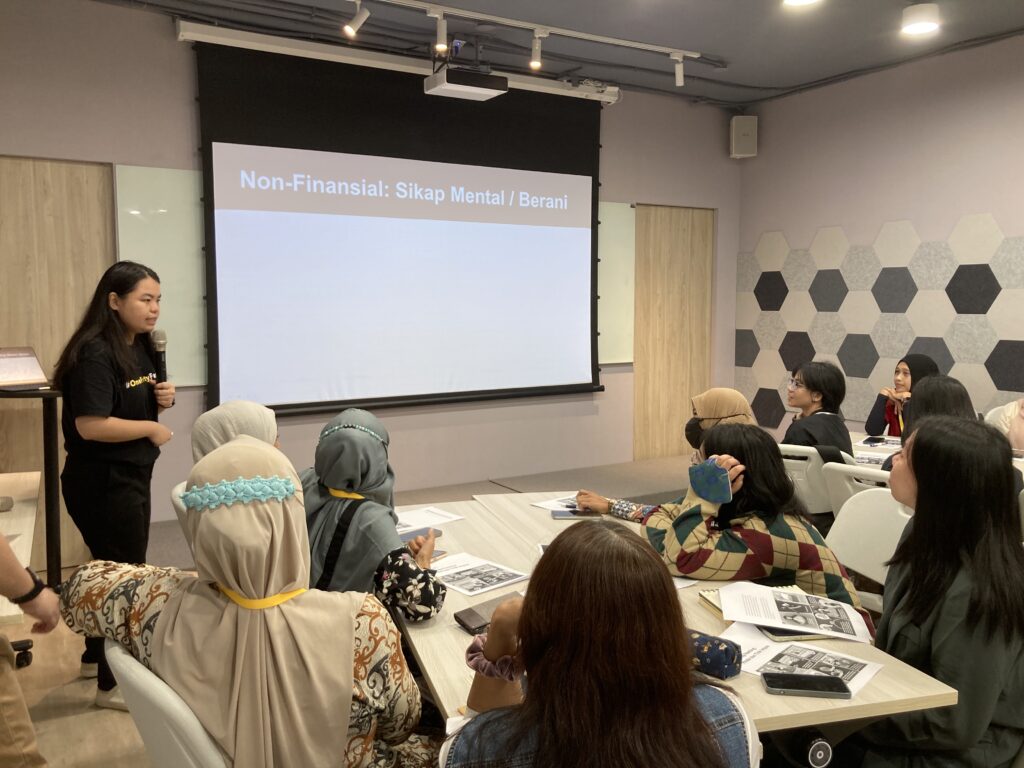
Financial Management Class with Indonesian Students
The financial management and self-development class began with One-Forty’s customary check-in activity, which featured a game of ‘tekuk jari.’ In this game, each participant shared a fun fact about themselves and lowered one finger on one hand for every fact they shared in common. This initial session broke the ice and fostered connections among the participants—a particularly valuable practice given the diverse experiences in the room. It allowed everyone, from seasoned entrepreneurs to those just beginning their journey, to feel heard and valued.
After the check-in, the teacher introduced the day’s agenda: a wrap-up of an online sharing event about starting a salon business, followed by a lesson in entrepreneurship fundamentals, covering biaya (cost), laba (profit), and titik usaha (break-even point). The teacher used a case study with a board game that each group could use to visualise the concepts. The structure was practical and straightforward, aiming to help participants with both immediate knowledge and long-term skills for financial stability and growth.
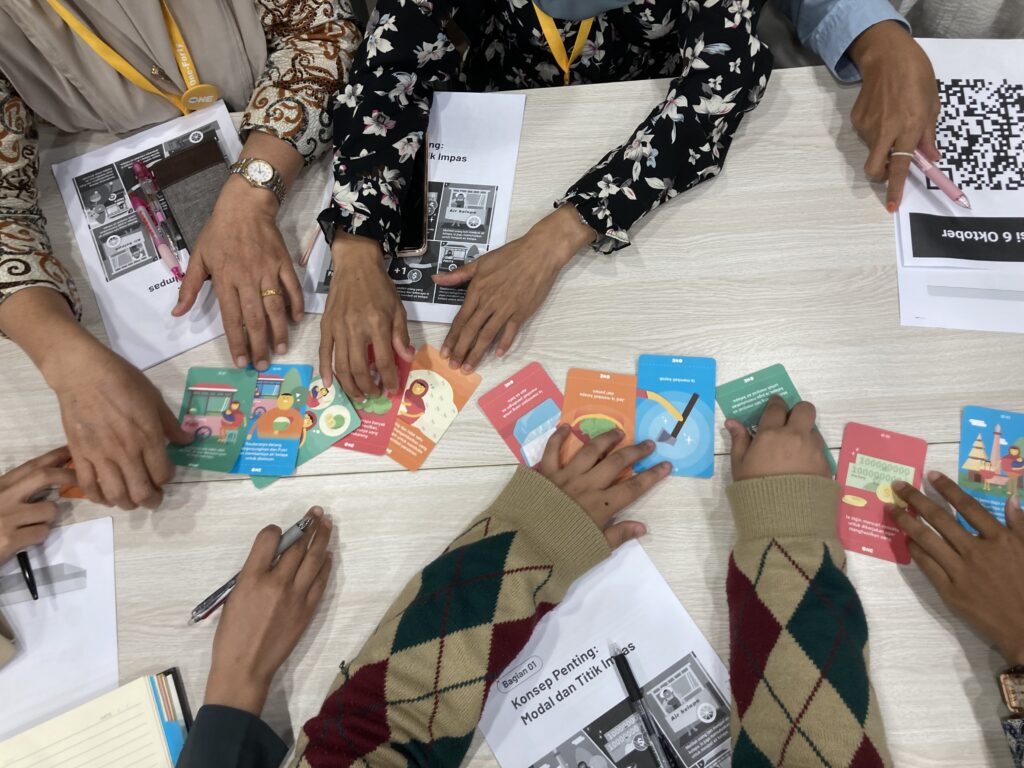
Putri’s Case Study as a Board Game
Individual Aspirations and Reflections
The teacher guided a discussion that allowed participants to share personal business aspirations and past experiences. These individual accounts offered valuable perspectives on the varied ways migrant workers envision creating stability and opportunity back home in Indonesia.
Ani
Ani dreams of opening a coffee shop in Ponorogo, having experience in planting coffee trees and processing its beans. She also wants to expand on her husband’s transportation business. Currently, her parents and older sibling are overseeing their coffee plantation. Her husband owns some trucks for transporting teak and mahogany wood. They’ve considered purchasing 4×4 cars to rent out.
Sari
With four years of experience in agriculture, Sari is considering branching out into online retail for agricultural goods. Currently, her family manages a farm back home, providing her with an annual income without her needing to monitor operations directly. Her goal is to expand the business while being hands-off, as she prefers not to be involved in daily payment tracking but values knowing the yearly output.
Rani
From Lampung, Rani has her sights set on the food business, particularly in catfish farming and culinary ventures. She believes that food—especially catfish—is always in demand and therefore “recession-proof.” Her challenge is learning more about catfish care and marketing, but she’s confident that her business idea aligns with local consumer needs and cultural preferences.
Andi
Andi wants to continue his family’s fisheries business, specifically in smoked fish, but with a focus on scaling up operations. His family already grows and sells durian, so he plans to leverage their existing agricultural land to support and expand both the smoked fish and fruit production ventures. Andi sees potential in catering to an upscale market by refining traditional methods and maintaining quality.
Mira
Before coming to Taiwan, Mira ran a coffee business, capitalizing on the availability of inexpensive coffee beans, which used to cost about 25,000 IDR per kilogram. However, with rising prices, Mira now wants to pivot to selling jamu (traditional herbal drinks) upon returning home. She sees jamu as both affordable and culturally appealing, which might allow her to tap into health-conscious customers interested in natural products.
Sinta
Sinta has experimented with several ventures, including coffee and catfish business, but now she’s considering something new. Previously, she handled coffee sales but found it exhausting. Her family also manages a farm where they raise livestock, reinvesting profits to buy more animals. Recently, she’s interested in starting a fertilizer business, though she’s still exploring the basics of organic and manure-based fertilizers.
Ayu
Ayu owns land in Padang and has long-term plans to start a small grocery store (sembako) there. She believes that her land’s location could support a steady flow of customers for daily essentials. Her objective is to open the store after gaining more experience, allowing her to utilize the property for a steady income stream.
Dewi
Dewi’s work in a baked goods factory in Taiwan has inspired her to start her own bakery back home. She loves baking and has learned many techniques and recipes, making her feel prepared to try something small-scale but quality-focused.
Mia
Mia envisions starting a mechanic workshop and a health and beauty clinic, aiming to cater to a diverse market in her hometown. While she hasn’t started, she’s determined to learn more about both sectors before diving in, understanding that both industries have distinct operational and financial needs.
Indah
Indah is uncertain about her entrepreneurial path, noting that the market in Jakarta is saturated. She’s considering other areas and wants more clarity before committing to a specific industry, preferring to explore various options until something feels right.
Hani
Hani is set on expanding her family’s palm plantation and cattle farm in Bengkulu. She feels that these industries offer reliable income in her province.
Kartika
Having spent 13 years running a grilled fish business in North Jakarta, Kartika is contemplating reopening a similar food stall, this time in partnership with her children. Her goal is to establish a family-run enterprise that they can carry forward, sustaining a business that could grow with her children’s involvement.
Riko
Riko plans to sell cloves. However, limited funds are a challenge. She’s currently focused on saving and learning about financing options to start this business, hoping that the abundance of cloves in her region can be utilised.
Wati
Wati’s family currently has a palm plantation and cattle farm back home in West Lampung. She noted that palm farming is low-maintenance yet profitable, with a biweekly harvest cycle that promises steady returns for years. Her long-term vision includes expanding these ventures to ensure financial stability for his family.
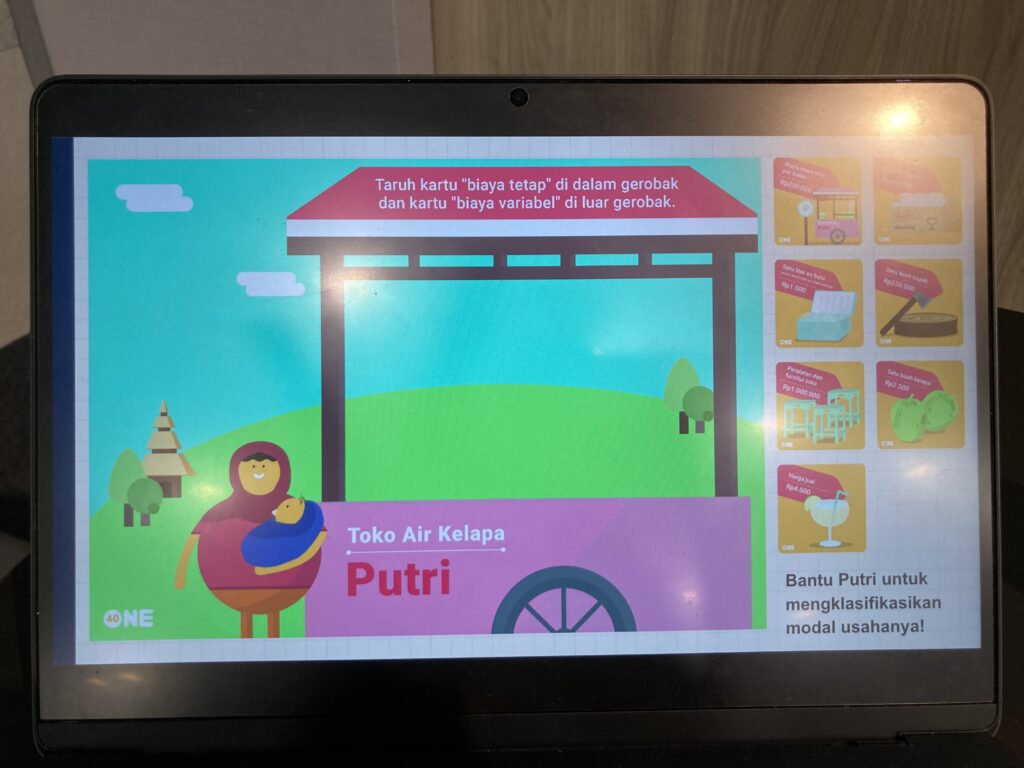
Key Insights from the Group: Lessons on Trust, Resilience, and Long-Term Goals
As the lesson came to a close, Wati expressed the importance of forming partnerships only with trusted individuals. She mentioned, “Saya percayakan pada keluarga, tapi harus jelas peran dan imbalan mereka,” emphasizing the need for transparent roles and clear returns. This sentiment of trust in business relationships resonated with many others who had also experienced disappointment in the past.
The teacher’s final words were about the value of having role models. He encouraged each participant to find a mentor or role model they could observe and learn from. This struck a chord with the group, as they began discussing figures they admired on social media, finding inspiration in the work ethic and resourcefulness they saw.
The class ended with an assignment: find a business role model, follow their strategies, and share their learnings with the group next week. This activity encouraged participants to think beyond immediate challenges, to envision their potential not just as business owners, but as creators of resilient, community-rooted enterprises.
Note: all names are pseudonyms.
Discover more from Elhana S.
Subscribe to get the latest posts sent to your email.



